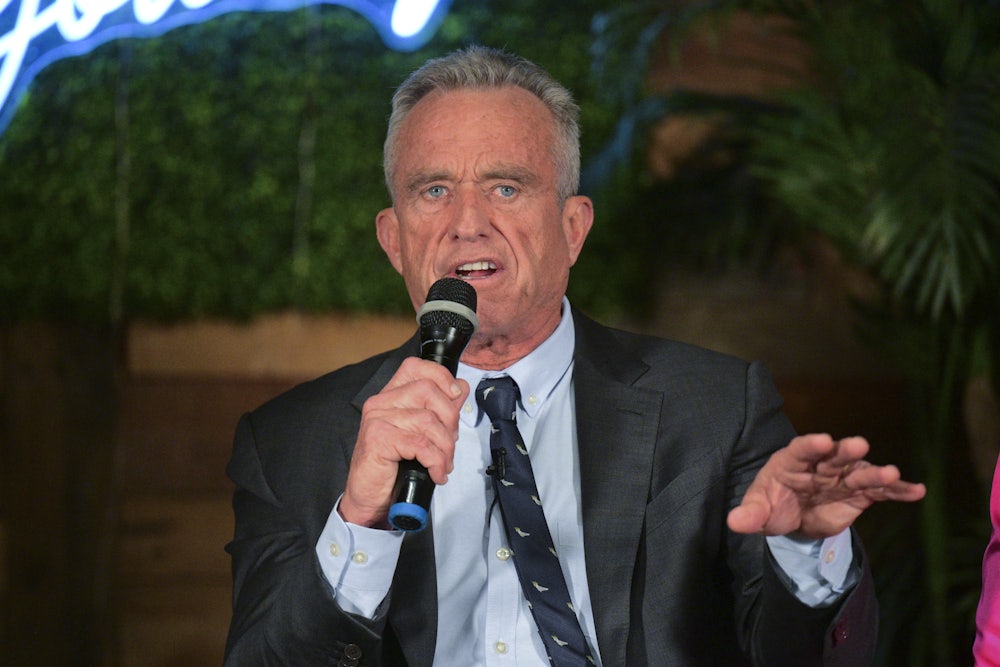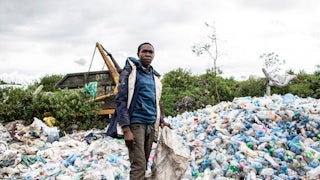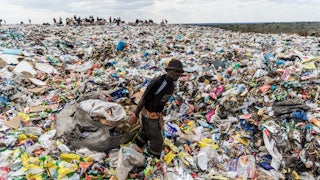We used to see “plastic” as the epitome of what humans, and all living things, were not. The phrase “plastic people”—memorialized in a 1960s-era song and a band name—was a metaphor for materialism and conformity, representing a fear that under consumer capitalism we could lose our humanity.
Things have gotten much worse since then. Now we really are plastic—or at least, our bodies contain far more plastic than most of us would prefer. Recent studies have found tiny plastic particles deep inside human lungs and blood. A new paper from Columbia University has identified nanoplastics—even smaller than microplastics, which we have been worried about for a while—as particularly prevalent, especially in bottled water. The average American adult may be consuming over 11,000 pieces of microplastic per year, another study calculated this month.
Yet media coverage of these findings typically insists we stay calm—that we still don’t know whether microplastics and nanoplastics are harmful to humans. A Washington Post report this month on the Columbia nanoplastics study emphasized that we “don’t yet know how dangerous tiny plastics are for human health.” The science on that is “unsettled,” agreed National Geographic. “People shouldn’t be panicking about the concentration of plastics in their food, with the caveat of ‘yet,’” one of the authors of a study on microplastics in meat, fish, and plant protein told another Washington Post reporter.
It is true that we don’t know about all the effects that microplastics might have on people. The World Health Organization found as much in a 2022 literature review. It’s incredibly hard to study, scientists say, because microplastics are everywhere: in our homes, our air, water, and even natural environments. Since we are all so full of plastic already, there is no control group.
Media hesitancy around microplastics is in part a defensive crouch against the torrent of misinformation on the topic. Noted crank and presidential hopeful RFK Jr., along with other dubious public figures, has made reckless claims, for example speculating that microplastics could be contributing to what Kennedy calls “gender confusion” among children. (He seems to be referring to queer and transgender identities.) There’s no evidence of that, and it’s red meat for the anti-trans far right. In deploying such queer-bashing and pseudoscientific narratives, Kennedy is fueling cultural tensions and hatreds that will do us no good.
But the need to refute such misinformation shouldn’t obscure the seriousness of what we do know about microplastics. Researchers like the Dutch scientist who co-authored one of the recent studies are also stating the obvious: “Yes, we should be concerned,” ecotoxicology professor Dick Vethaak told National Geographic last year. “Plastic should not be in our blood.”
Those who make their living hawking plastic toxins naturally seize upon scientific ambiguity to portray concern over plastic particles as fearmongering. The trade association that represents bottled water—one of the most unnecessary products on earth—gleefully crowed this month that there was “no scientific consensus” on the harms of plastics in drinking water, adding that media reports on the topic “do nothing but scare consumers.”
But if you’re not the CEO of a bottled water company, it should be clear that having tiny bits of plastic in our bodies can’t be good. For one thing, their effect other living creatures, including earthworms and fish, is well understood. A government study last summer found that plastic particles compromised the immune systems of fish, making them more likely to die when exposed to viruses. A large body of research has also found that microplastics affect fish in a range of other ways: weakening their fertility, disrupting their feeding habits, harming their livers, and damaging their gills, among other problems. They cause a range of similar ills in laboratory rats and mice, including, alarmingly, “dysfunctions of the intestine, liver, excretory and reproductive systems.”
From the animal research, scientists are pretty sure that microplastics are not good for you. The National Institutes of Health wrote in 2022 that, although the matter was “controversial,” the effects on mice and rats “suggest a profound negative influence of microplastics on human health.” No expert thinks that there is any special reason why humans would be more resilient to bodily invasion by tiny plastic bits than other life forms would be.
There’s also research on regular plastic, which isn’t pretty, and from which it wouldn’t be unreasonable to extrapolate that we don’t want plastic in our blood and lungs. Plastic contains endocrine-disrupting chemicals that can affect our reproductive functioning and may also be linked to lung disease, diabetes, obesity, thyroid problems, testicular cancer, breast cancer, and many other diseases.
How much more evidence do we really need? We need a lot less plastic in our bodies (as well as our oceans and air). We know enough to know that this is bad, even if more research is needed to map the extent and specifics of the harm. It’s time for a stronger politics of plastics abolition.
This is a problem we have the technology to solve. There are plenty of alternatives to plastics, which only need a combination of government bans and incentives to thrive. Canadian researchers are also using exciting new A.I. tools to identify microplastics in wastewater, which will make the problem and its human health impacts easier to measure and study.
Kennedy has rightly criticized the Biden administration for doing too little to combat the problem of microplastics pollution, and has a detailed plan, from banning the most hazardous chemicals to recycling reforms to seriously curtailing production of plastics.
It’s not great that Kennedy is the only prominent politician—and Alex Jones the most visible media personality—calling attention to plastics pollution, a problem that rightly worries many Americans. But lazily associating the plastics problem with crank sources is a dodge that needs to end. The solutions are not that complicated, and the risks of inaction are truly disturbing.






